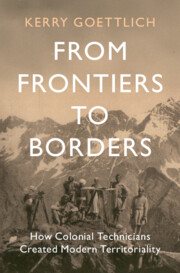Book contents
- From Frontiers to Borders
- LSE International Studies
- From Frontiers to Borders
- Copyright page
- Contents
- Figures
- Tables
- Preface
- 1 The Problem of Colonial Borders
- 2 Modern Territoriality Redefined
- 3 The Settler Colonies
- 4 British India and Beyond
- 5 The Origins of Boundary Studies
- 6 The Paris Peace Conference
- 7 Conclusion
- Bibliography
- Index
5 - The Origins of Boundary Studies
From Natural Law to Modern Science
Published online by Cambridge University Press: 23 October 2025
- From Frontiers to Borders
- LSE International Studies
- From Frontiers to Borders
- Copyright page
- Contents
- Figures
- Tables
- Preface
- 1 The Problem of Colonial Borders
- 2 Modern Territoriality Redefined
- 3 The Settler Colonies
- 4 British India and Beyond
- 5 The Origins of Boundary Studies
- 6 The Paris Peace Conference
- 7 Conclusion
- Bibliography
- Index
Summary
The second part of the book moves from the origins of linear borders to their consequences for international politics. Because linear borders are distinguished from other kinds of frontiers by certain technical practices, it is the expertise involved in these practices which forms a central part of how the linearization of borders makes a difference. Chapter 5 charts the emergence of modern boundary studies, focusing in particular on the writings of colonial surveyor Thomas Holdich, academic geographer Ellen Semple, and Viceroy of India Lord Curzon. This subfield grew partly out of a meeting between political geography and the practice of colonial surveying in the late nineteenth century. I show how boundary studies was able to give new life, for a few crucial decades, to the otherwise questionable and politicized idea of ‘natural boundaries’ as a respectable scientific concept, and argue that colonial knowledge was key to its emergence.
Information
- Type
- Chapter
- Information
- From Frontiers to BordersHow Colonial Technicians Created Modern Territoriality, pp. 144 - 185Publisher: Cambridge University PressPrint publication year: 2025
Accessibility standard: Inaccessible, or known limited accessibility
Why this information is here
This section outlines the accessibility features of this content - including support for screen readers, full keyboard navigation and high-contrast display options. This may not be relevant for you.Accessibility Information
Content Navigation
Allows you to navigate directly to chapters, sections, or non‐text items through a linked table of contents, reducing the need for extensive scrolling.
Provides an interactive index, letting you go straight to where a term or subject appears in the text without manual searching.
Reading Order & Textual Equivalents
You will encounter all content (including footnotes, captions, etc.) in a clear, sequential flow, making it easier to follow with assistive tools like screen readers.
Structural and Technical Features
You gain clarity from ARIA (Accessible Rich Internet Applications) roles and attributes, as they help assistive technologies interpret how each part of the content functions.
